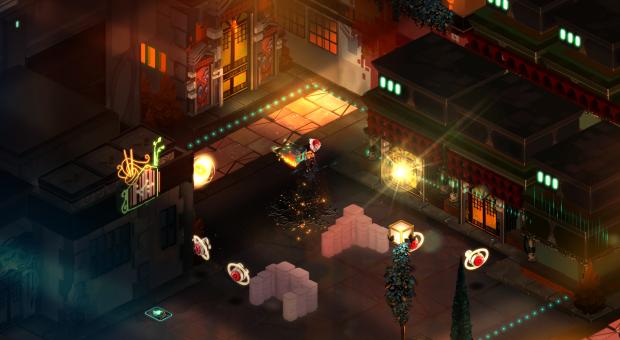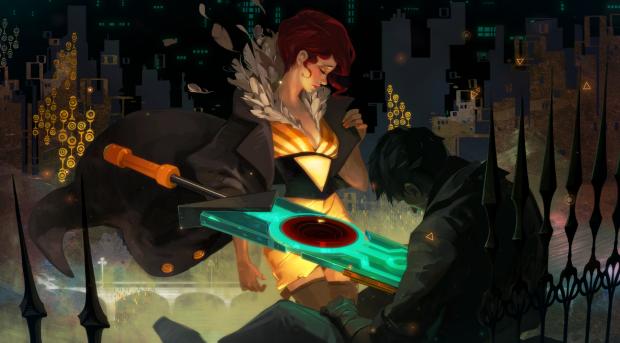From the soundtrack and the visuals, to the gameplay and the story, Transistor gets just about everything right. As the follow up to a critically acclaimed and much loved title such as Bastion, it feels like a clever evolution upon an idea, and despite brief initial concerns that this might just be “more Bastion”, within fifteen minutes the captivating story has you, as does the jaw-dropping new combat mechanic.
Almost by stealth, Supergiant Games have dropped an entirely new system into the existing isometric combat style they had done so well with previously. At first, it’s just moving about and using any of the face buttons to execute a move, but suddenly Transistor tells you that you can push a trigger to pause time, allowing you to plan (then execute) an entire string of moves. This is the first of many jaw-on-the-floor moments, and it feels fresh, new, and incredibly exciting.
What it means, essentially, is that Transistor is an incredibly accessible game. You can play it just as an isometric (almost) hack and slasher if you fancy, but the real joy is planning out an attack on multiple enemies, before escaping to cover behind one of the many electronically generated walls, waiting for your timer to reset, and starting it all over again.

But there’s so much more to it than that. Each of the four moves you can use are entirely customisable, and as you get more moves through levelling up, you can switch them out entirely for new ones. Every single skill you acquire has an effect on every other skill. For example, you’ll quickly get an ability that lets you turn an enemy into an ally for a short time. This is an ability of its own, and can be used as such – but I found it much more useful to augment my dash manoeuvre so that as I dashed through an enemy it would change them to my side, and damage other enemies as I escaped. Another example would be the ability to summon a friend to fight alongside you for a brief moment. Again, this can be used as a standalone ability, or equipped as an upgrade to one you’re already using.
There are also passive ability slots (a total of four, unlocked as you play), and every ability you collect can drop into those, too, and they have a different effect again. All of these are changeable at specific points in the game, which also act as save points. Furthermore, there are “limiters”. A whole separate set of abilities, these are designed to make the game harder. Some of them are excruciating, but the more you equip, the higher your bonus experience will be. For some, the challenge will be the reward, but those who just want to enjoy the story can ignore the limiters altogether. It’s a clever idea that means you are tailoring the game to your own skill-set, but without breaking the immersive world and entirely tying into the lore.

And what lore it is. Entrenched in the unique language and code of Transistor, at times it can be complicated, but it always makes sense. You are playing the role of Red, a radiantly beautiful famous singer, who starts the game losing someone close. I wouldn’t dream of spoiling things here, but the titular Transistor is the sword you carry the entire game, and also the narrator – Red is mute, save for her ability to hum.
The enemies are referred to as “the Process”, and have a nice amount of variation right up until the end, with each requiring a different tactic. One can heal the others, so you kill that one first, and so on. There are a gang of four behind the slow decimation of the city (via the Process) and Red wants to kill them. It quickly becomes a race against time for Red to save the city, before the Process destroys everything.
It plays out over roughly five to six hours (depending on skill), and is extended by a room accessible now and again that offers challenges involving the combat, and a safe haven or break from the narrative, if you want it. The story is superbly paced, with a satisfying conclusion that builds to a final crescendo. There are revelations and sad moments, yet there is such beauty in the art design you will be captivated throughout. Whether it’s the general look of the game or the few transitional scenes between major levels, there is no moment that doesn’t look good, or unique – and that’s including the enemies and the characters themselves.

Transistor contains not only some of the most stunning art design, but one of the best game soundtracks I have ever heard. The droning bass of the main theme is mesmeric, and any music with vocals is astonishing – this is a soundtrack you’re going to want to buy, and composer Darren Korb has absolutely delivered.
Logan Cunningham reprises his role as the main narrator and, as such, he’s the voice of the game. But the interaction between he and Red is heart-warming and feels natural thanks to some excellent writing. There are terminals littered around the world that you can interact with, and help to flesh out the world of Transistor further. It wraps up nicely, and you’re only left wanting more because it is such an excellent experience overall. Thankfully a new game plus mode is present, allowing you to start again with your skill-set and face harder enemies.
There is so much to enjoy, that I almost missed the fact that the DualShock 4 was being used in an interesting way. As the Transistor speaks to Red, it flashes and changes colours in sync with the voice. It’s a tiny thing that you might not even notice, but it’s further proof that Supergiant Games went further than they even needed to, in order to deliver something truly special. One warning, however: initially the default setting is that the Transistor’s voice comes out of the main TV-mix, but a quick dip into the options menu will show you the option to have it coming out of the DualShock 4’s speaker.
VERDICT: As the credits rolled and the closing song played out, I felt privileged to have experienced Transistor. It’s only when I sat down to write this, however, that I realised I couldn’t find any real faults. It may not be the longest experience, but it is worthy of absolutely anyone’s time. Supergiant have delivered, and proved that if you really care about something, it will show when it is played.
It may be slightly too complex in parts for the more casual gamers out there, but it’s full of clever ideas, and every area has had attention lavished upon it. Transistor is comfortably one of the best games of 2014 so far, and Supergiant deserve the plaudits yet again for a job well done.

INCREDIBLE. This is the pinnacle of our scoring spectrum, reserved for games that truly affect us, that capture our imagination so completely that they affect the standard by which we measure future games. 10/10 is not a declaration of perfection, but an assurance that the game in question is of amazingly high quality and has exceeded our expectations.
Review copy provided by the publisher.





